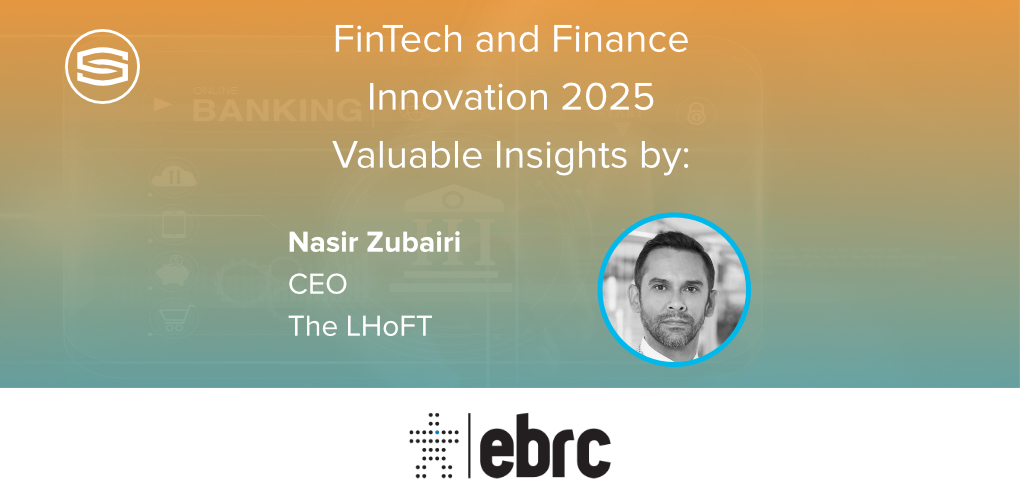
Insights & Opinions
FinTech and Finance Innovation 2025: Insights by Nasir Zubairi
Thu, 10 Feb 2022


Nasir Zubairi, CEO of the LHoFT, was one of the prominent contributors to the report “Finance and Fintech Innovation 2021 – Hybridization Designs the Future of the Finance Industry”. We spoke about the impact of COVID-19 on fintech, embedded finance, today’s challenges of financial education, and so much more.
In the context of the future of the finance industry, three messages lingered in my mind.
The positive effects of COVID-19 on FinTech
Over the past years, consumers embraced mobile banking. With the pandemic, they needed to trust digital payment means for both in-store and e-commerce shopping and financial advice. The crisis accelerated the adoption of digital financial services tools.
Because of that, Nasir concluded that, in general, the effects of the crisis were positive for FinTech.
Moreover, Nasir observed much more willingness from B2B businesses to embrace digitalisation. He believes that we are just at the start of a new FinTech wave. Embedded finance, where financial services are integrated into non-financial journeys to ease the life of clients, could be a catalyst for this further technological acceleration.
Embedded finance can help banks reduce their costs and find new markets in parallel, thus generating more revenues in the longer term. By looking for partners with unique strengths, banks can refocus on what they are good at instead of building and managing everything on their own.
Most banks will need agile support from FinTech companies to build this ecosystem. But also in the race to a greener society, Nasir sees opportunities for his members. Tokenisation of securities is one of the domains he strongly believes in.
“Issuing sustainable securities or green securities cost more than issuing standard securities because to validate that the security is sustainable or green, you have additional costs in reporting, data management, etcetera, to the investors. You can reduce the overall cost of issuing a security by lowering the issuing costs using tokenization,” Nasir explained.
“Maybe at a later stage, using the smart contracts embedded in the tokens as a form to connect and automate a lot of that data reporting and data management, you’re going to drive down the cost of issuing sustainable securities, and therefore make them more attractive.”
Collaborate or die
“The premise of everything we do in Luxembourg was based upon our belief and our hypothesis, that the future of financial services is about a collaboration between Fintech and the traditional industry”, explained Nasir.
COVID-19 shook up the financial services industry. In Q2 2020, banks realised they required the agility, creativity and innovation of FinTech companies to pivot their services to a completely digital model. FinTech companies, on the other hand, embraced the bank’s offered hand, as it gave them access to much more resources, but also clients and a trusted brand.
According to Nasir, this combination is a win-win situation that will shape the future of finance. This is also the future that the LHoFT is pursuing. Nasir: “We work with the traditional industry to help educate them, to enable them as much as possible, to see the opportunities in financial services and digitalization, and embedded finance as well obviously. At the other end, we support the Fintech firms to ensure that they can continue delivering those services to market the best way possible.”
COVID-19 as a catalyst for consolidation in banking?
The question is whether new collaboration initiatives and new trends like embedded finance suffice to cure every bank in Europe.
COVID-19 had a profound impact on banking. Incumbent banks that lagged behind the digitalisation train still had the excuse that not every customer asked for digital banking. This changed during the pandemic. Social distancing made digital services the only way to do any business.
Banks that struggled with technological advancements in 2019 face an even darker future today. With a return on equity less than 6% for European banks in 2020, Nasir expects consolidation in the banking market as part of the transformation it has been undergoing in recent years.
Nasir: “The productivity of the banks is not good, and I believe that there’s going to be a general clean-up in the banking sector. COVID-19 may be the catalyst for that. Defaults are going to rise, and I think many banks are going to be in trouble. Expect a giant shakeup and a lot of disruption in the finance industry as a whole.”
Banks have two ways to boost their productivity: find new revenue streams or rationalise their cost structure. As the pressure on interest rates is not likely to end any time soon, cost rationalisation is the only viable short-term option for most banks. New digital enhancements are one route to achieve this. Joining forces through mergers and acquisitions is another way.
Conclusion
We could say that the pandemic changed the order of priorities for financial services firms, but as such, it didn’t change the topics on the list. We live in exciting times where partnerships will reshape the way we manage and consume finance. Organisations like the LHoFT, and also the “Powered by EBRC” program are a catalyst and a facilitator to make these partnerships a success.
If you like to know more, we recommend you to read the white paper “Finance and Fintech Innovation 2021 – Hybridization Designs the Future of the Finance Industry”, including insights of Nasir Zubairi and many more key stakeholders of the Luxembourg finance industry.
More articles of different contributors to this study can be found here.
At The Banking Scene Conference 2022 Luxembourg on February 22nd, you get the chance to join the conversation. Together, we investigate how banks should pivot their role in society to continue being trusted partners for their stakeholders in the future.